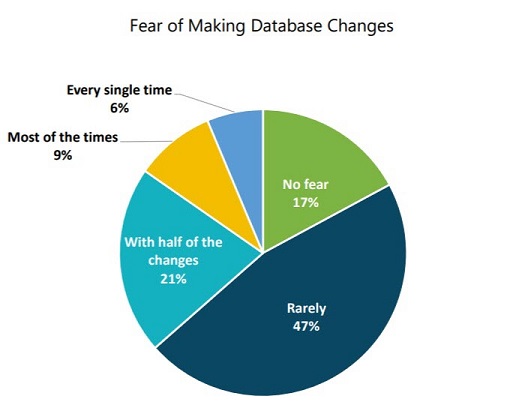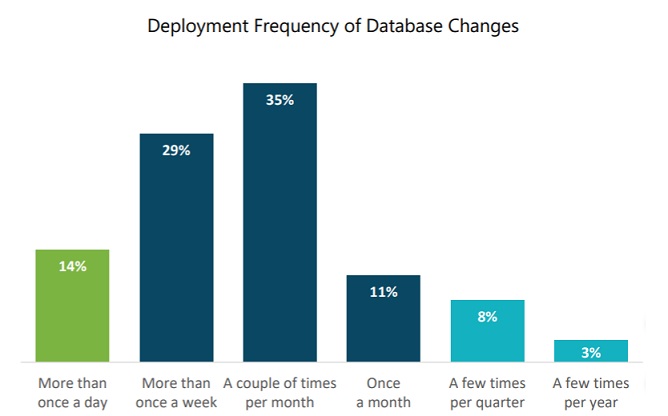Check Point® Software Technologies Ltd.(link is external) announced that U.S. News & World Report has named the company among its 2025-2026 list of Best Companies to Work For(link is external).
When was the last time your company experienced a significant database error? If it happened in the last 3 months, you’re in good company. A recent study conducted by DBmaestro asked 244 IT professionals this very question; 60% of respondents reported a crash or significant database error occurring in the last 6 months. Roughly one in ten respondents reported a serious database problem in the past week.
The survey, conducted online in October, sheds light on common practices in database management, errors and risks, as well as the rate of adoption of DevOps practices throughout all R&D functions. The results show that while DevOps practices have been widely adopted and utilized in application development, databases have been left behind. Crashes and major errors are prevalent among respondents, and even more so among companies that attempt to push database changes often.
Database Errors are Costly, Frequent, Dreaded
Database errors can be expensive; estimates vary, but studies show that an hour of database downtime can cost your business anywhere from $100,000 to $600,000+ an hour. These estimates have been growing steadily in the last several years, and can be even bigger for companies that rely heavily on timely database data retrieval for business operations.
While there can be many different causes for serious database errors, the 2018 Database Devops Survey reveals that the top causes are accidental overrides, invalid code and conflicts between teams. These three horsemen of the apocalypse account for over 50% of major database errors, respondents report.
For these reasons, it comes as no surprise that pushing changes to the database involves dread. In fact, over one-third of respondents reported that they are anxious about pushing database changes at least half the time.

DevOps Practices Used Widely – But Not for Databases
The fear-inducing errors that lead to crises when pushing new changes have all long been solved in the world of code development. With the extensive adoption of DevOps practices across multiple industries, similar errors in application development have been reduced to nothing. In fact, when asked about continuous delivery practices, 54% of respondents report that they are fully implemented in at least half of the company’s application development projects.
Adoption of these practices for the database is slow and lagging, the report shows. Only 36% of respondents report that they've implemented continuous delivery practices for database changes. On top of that, most respondents report that only the DBAs are allowed to push changes, often making them a bottleneck in the process.
It comes as no surprise that the result is slow, infrequent changes deployed to the database. Almost half (46%) of respondents reveal that they are only able to deploy database changes once or twice a month, a fact that stands in stark contrast to environments where CI/CD practices enable multiple deployments daily. In fact, only 14% of respondents currently have that capacity for database deployments.

Onward and Upward
The bottom line is clear: database needs to hop on the DevOps bandwagon, and fast. The only way to eliminate and prevent major database errors is by automating processes and adopting continuous delivery practices, stat. In turn, this will also improve the ability to push database changes often and fast, making the database as agile as any other part of the company’s development process.
Industry News
Postman announced new capabilities that make it dramatically easier to design, test, deploy, and monitor AI agents and the APIs they rely on.
Opsera announced the expansion of its partnership with Databricks.
Postman announced Agent Mode, an AI-native assistant that delivers real productivity gains across the entire API lifecycle.
Progress Software announced the Q2 2025 release of Progress® Telerik® and Progress® Kendo UI®, the .NET and JavaScript UI libraries for modern application development.
Voltage Park announced the launch of its managed Kubernetes service.
Cobalt announced a set of powerful product enhancements within the Cobalt Offensive Security Platform aimed at helping customers scale security testing with greater clarity, automation, and control.
LambdaTest announced its partnership with Assembla, a cloud-based platform for version control and project management.
Salt Security unveiled Salt Illuminate, a platform that redefines how organizations adopt API security.
Workday announced a new unified, AI developer toolset to bring the power of Workday Illuminate directly into the hands of customer and partner developers, enabling them to easily customize and connect AI apps and agents on the Workday platform.
Pegasystems introduced Pega Agentic Process Fabric™, a service that orchestrates all AI agents and systems across an open agentic network for more reliable and accurate automation.
Fivetran announced that its Connector SDK now supports custom connectors for any data source.
Copado announced that Copado Robotic Testing is available in AWS Marketplace, a digital catalog with thousands of software listings from independent software vendors that make it easy to find, test, buy, and deploy software that runs on Amazon Web Services (AWS).
Check Point® Software Technologies Ltd.(link is external) announced major advancements to its family of Quantum Force Security Gateways(link is external).
Sauce Labs announced the general availability of iOS 18 testing on its Virtual Device Cloud (VDC).




